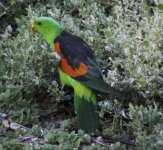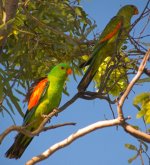RodOutback
New member
- Nov 23, 2014
- 17
- 0
Folks,
I have spent my whole life under the belief that the Red-Winged Parrots we see in our garden, were Lorikeets?
Reading a bit more info this morning, I suspect the definition of a Lorikeet (tongue adapted for nectar??) EXCLUDES these parrots from being called a Lorikeet.
Am I right?
Attached are a couple of images of the bird I'm talking about. I think his scientific name is Aprosmictus erythropterus.
Are these parrots ever bred in captivity? I seem to be reading that they don't play nice with others, and I don't seem to find them mentioned much anywhere. So, I wondered if they do have a following.
There are a group of between 6 and 10 of these birds that appear in our homestead garden every few weeks, and usually hang around for a few days. I note they are usually around when the temp climbs above 40 degrees Celsius, as it did last week.
When we have some (of that mythical) green grass around, there is a small melon that grows wild; locally called a PaddyMelon. It is about the size of a large grape, and has a strong smell similar to a cucumber. Interior flesh seems to be much like a Lebanese cucumber, though it is far too bitter for me to try eating one...
I do recall some enterprising people have made jam from them.
However, the red-Wings seems to find them a great snack, and will spend days in the garden; munching their way through all they can find. One of the attached images from 2006 shows a male, holding one of the Paddymelons in one claw.
For those interested, there are a number of other Red-winged parrot images uploaded to my Photobucket site (link should be in my signature). Not the best of images; I have upgraded the camera a number of times since these images were taken, but for some reason, have neglected to update the Red-Wing photos.
Yesterday, we had a group of 16 Red-Tailed Black Cockatoos wheezing it up in one gum tree in the house yard, for a few hours.
Of course; as soon as I went to retrieve the camera from the car, they had places to be....sigh.
Bloody wildlife....
I have spent my whole life under the belief that the Red-Winged Parrots we see in our garden, were Lorikeets?
Reading a bit more info this morning, I suspect the definition of a Lorikeet (tongue adapted for nectar??) EXCLUDES these parrots from being called a Lorikeet.
Am I right?
Attached are a couple of images of the bird I'm talking about. I think his scientific name is Aprosmictus erythropterus.
Are these parrots ever bred in captivity? I seem to be reading that they don't play nice with others, and I don't seem to find them mentioned much anywhere. So, I wondered if they do have a following.
There are a group of between 6 and 10 of these birds that appear in our homestead garden every few weeks, and usually hang around for a few days. I note they are usually around when the temp climbs above 40 degrees Celsius, as it did last week.
When we have some (of that mythical) green grass around, there is a small melon that grows wild; locally called a PaddyMelon. It is about the size of a large grape, and has a strong smell similar to a cucumber. Interior flesh seems to be much like a Lebanese cucumber, though it is far too bitter for me to try eating one...
I do recall some enterprising people have made jam from them.
However, the red-Wings seems to find them a great snack, and will spend days in the garden; munching their way through all they can find. One of the attached images from 2006 shows a male, holding one of the Paddymelons in one claw.
For those interested, there are a number of other Red-winged parrot images uploaded to my Photobucket site (link should be in my signature). Not the best of images; I have upgraded the camera a number of times since these images were taken, but for some reason, have neglected to update the Red-Wing photos.
Yesterday, we had a group of 16 Red-Tailed Black Cockatoos wheezing it up in one gum tree in the house yard, for a few hours.
Of course; as soon as I went to retrieve the camera from the car, they had places to be....sigh.
Bloody wildlife....

